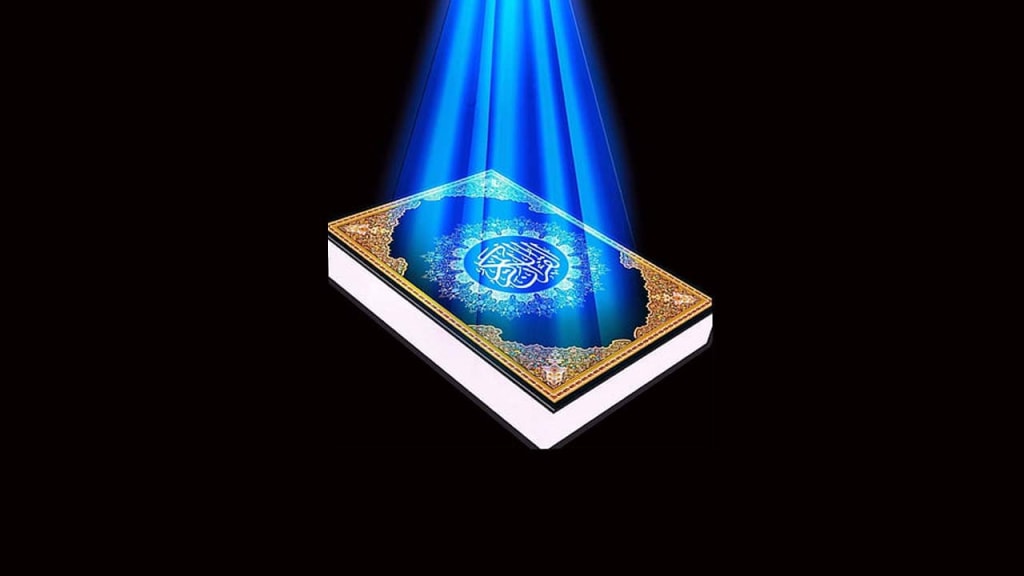Ancient Wisdom and Modern Discoveries
Quran and Science

Science and the Quran: Ancient Wisdom and Modern Discoveries
Introduction:
Science and religion have often been perceived as opposing forces, with many believing that the two cannot coexist harmoniously. However, when we delve into the Quran, the holy book of Islam, we find numerous verses that seem to echo the discoveries of modern science, shedding light on the idea that what science is saying now, has been said in the Holy Quran long ago. This article explores some striking examples of scientific knowledge in the Quran and highlights how these revelations align with contemporary scientific understanding.
1. The Creation of the Universe:
One of the most awe-inspiring verses in the Quran is found in Surah Al-Anbiya (21:30): "Do not those who disbelieve see that the heavens and the earth were a closed-up mass, then We opened them out?" This verse alludes to the Big Bang theory, which is widely accepted by scientists as the prevailing explanation for the origin of the universe. The Quranic description of the universe's expansion parallels the scientific understanding of cosmic evolution.
Reference:
- Hawking, S. W. (1988). A Brief History of Time. Bantam Books.
2. Embryology:
The Quran contains remarkable insights into human embryology. Surah Al-Mu'minun (23:12-14) describes the stages of human development in the womb: "And certainly did We create man from an extract of clay. Then We placed him as a sperm-drop in a firm lodging. Then We made the sperm-drop into a clinging clot, and We made the clot into a lump [of flesh], and We made [from] the lump, bones, and We covered the bones with flesh..." These verses accurately depict the stages of embryonic development, as confirmed by modern embryology.
Reference:
- Moore, K. L., Persaud, T. V. N., & Torchia, M. G. (2015). Before We Are Born: Essentials of Embryology and Birth Defects. Saunders.
3. The Water Cycle:
The Quran references the water cycle in Surah Al-Mu'minun (23:18): "And We sent down from the sky rain charged with blessing, and We brought forth therewith gardens and grains for harvest." This verse alludes to the process of evaporation, condensation, and precipitation, which is central to the Earth's water cycle—an essential component of sustaining life on our planet.
Reference:
- IPCC (2013). Climate Change 2013: The Physical Science Basis. Cambridge University Press.
4. Mountains and Earth's Crust:
The Quran describes mountains as "stakes" or "pegs" that stabilize the Earth's crust, preventing it from shaking. Surah An-Naba (78:6-7) states: "Have We not made the earth as a wide expanse, and the mountains as pegs?" Modern geology confirms that mountains play a crucial role in the Earth's tectonic stability, serving as "pegs" that anchor the continents.
Reference:
- Turcotte, D. L., & Schubert, G. (2014). Geodynamics (3rd ed.). Cambridge University Press.
The Holy Quran contains several verses that provide insights into what it says about life after death. Here are some key verses along with references:
5. **The Concept of the Hereafter:**
- Surah Al-Baqarah (2:197): "And take provisions, but indeed, the best provision is Taqwa. So fear Me, O you of understanding."
This verse emphasizes the importance of piety (Taqwa) and suggests that it is a provision for the Hereafter.
6. **Resurrection and Judgment:**
- Surah Al-Qiyamah (75:3-4): "Does man think that We will not assemble his bones? Yes. [We are] Able [even] to proportion his fingertips."
These verses indicate the belief in the resurrection of the dead and the gathering of all individuals for judgment.
7. **Accountability for Deeds:**
- Surah Al-Isra (17:13-14): "And [for] every person, We have imposed his fate upon his neck, and We will produce for him on the Day of Resurrection a record which he will encounter spread open. [It will be said], 'Read your record. Sufficient is yourself against you this Day as accountant.'"
These verses highlight the idea that every person's deeds are recorded, and they will be held accountable for their actions on the Day of Resurrection.
8. **Rewards and Punishments:**
- Surah Al-Imran (3:185): "Every soul will taste death, and you will only be given your full compensation on the Day of Resurrection. So he who is drawn away from the Fire and admitted to Paradise has succeeded. But the life of this world is only the enjoyment of delusion."
This verse emphasizes that the true reward or punishment will be received in the Hereafter, and this worldly life is temporary.
9. **Eternal Life in Paradise or Hell:**
- Surah Al-Insan (76:12-13): "And there will circulate among them [servant] boys [especially] for them, as if they were pearls well-protected. And they will approach one another, inquiring of each other."
These verses describe the blessings of Paradise, where believers will have eternal joy and companionship.
- Surah Al-Mujadila (58:8): "Have you not considered those who were forbidden from private conversation, then they return to that which they were forbidden and converse among themselves about sin and aggression and disobedience to the Messenger? And when they come to you, they greet you with that [word] by which Allah does not greet you and say among themselves, 'Why does Allah not punish us for what we say?' Sufficient for them is Hell, which they will [enter to] burn, and wretched is the destination."
These verses mention the consequences of disobedience and wrongdoing, indicating Hell as a place of punishment.
These are just a few examples of what the Holy Quran says about life after death. The Quran provides detailed descriptions of the Hereafter, including the concept of Paradise (Jannah) and Hellfire (Jahannam), the nature of the Day of Judgment, and the ultimate destiny of individuals based on their faith and deeds. Belief in the Hereafter is a fundamental aspect of Islamic faith and serves as a source of motivation for leading a righteous and pious life in this world.
Conclusion:
The Quran, with its timeless wisdom, offers verses that resonate with the findings of modern science. While these examples demonstrate intriguing parallels, it is essential to approach such comparisons with respect for both faith and scientific inquiry. The convergence of scientific knowledge and religious texts like the Quran encourages dialogue and understanding between these seemingly distinct realms, fostering a deeper appreciation for the wonders of the natural world. As science continues to advance, we may discover even more instances where what science is saying now was already expressed in the Holy Quran long ago, further strengthening the bridge between faith and reason.
About the Creator
Abdullah Rajon
Experienced content writer skilled in SEO optimization, research, and deadline-driven delivery. Let's create engaging content together!






Comments
There are no comments for this story
Be the first to respond and start the conversation.